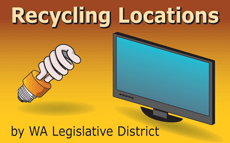Washington Mercury Stewardship Activities
 Washington Mercury Lights Stewardship Program
Washington Mercury Lights Stewardship Program
LightRecycle Washington, the product stewardship program for mercury-containing lights, began Jan. 1, 2015 - find a collection location near you to recycle compact fluorescent lights, fluorescent tubes up to 8 feet long, and High Intensity Discharge (HID) lights.
Engrossed Substitute House bill 2246 (ESHB 2246) – Regarding financing for stewardship of mercury-containing lights: Passed by the Legislature on 3/7/14.
- House activity on HB 2246: Introduced Jan. 15, 2014, was heard in the House Environment Committee on Jan. 21. A substitute bill passed out of this committee on Jan. 31 and was referred to the House Rules Committee. The bill was "pulled" from Rules to the floor on Feb. 12. Passed the House on Feb. 13 on a 56-41 vote.
- Senate activity on ESHB 2246: referred to the Senate Energy, Environment, and Telecommunications Committee and passed out on Feb. 25 on a 6-2 vote. Referred to Ways & Means (due to a relatively small fiscal cost in year 1 for JLARC's performance plan for their sunset review). On March 3, the Ways & Means Committee referred ESHB 2246 to the Rules Committee without recommendation, reflecting the bill's lack of fiscal impact to the state. Passed the Senate on March 7 on a 31-18 vote.
- Next, ESHB 2246 goes to the Governor's desk for signing.
ESHB 2246 amends the 2010 WA Mercury-containing Lights Stewardship Law (70.275 RCW). The bill is a negotiated agreement between stakeholders that the National Electrical Manufacturers Association supports. Passage of ESHB 2246 ensures adequate financing for the stewardship program and resolves the lighting industry's lawsuit against the state that has delayed program implementation.
Brief overview of ESHB 2246:
- Summary of ESHB 2246 (PDF)
- Authorizes lighting producers to add an environmental handling charge to the price of mercury lights sold at retail in WA state. A stewardship organization representing lighting producers will propose the amount of the charge, which will be reviewed and approved by WA Ecology. The legislation requires that the charge is added to the purchase price of the lamp, but does not require that the charge is visible at point of sale.
- Each lighting producer is responsible for ensuring the environmental handling charge is remitted to a stewardship organization for their lamps sold at retail in the state. The bill allows two options for how the environmental handling charge is collected and remitted to the producer's stewardship organization:
- (1) producers add the charge to the purchase price of their lamps and remit the charge, or
- (2) a retailer forms a voluntary binding agreement with a producer to add the charge to the purchase price of the lamp and remit the charge on the producer's behalf. Producers may not require or force retailers to do this.
- [In a similar stewardship program in B.C., paid for by lighting producers, the charge included in the product price was 15 cents per CFL and 80 cents for a 4 foot fluorescent tube, in 2013.]
- The bills modify the responsibilities of the stewardship organization for collection costs, and for education. Under the existing statute and this legislation, the stewardship program's responsibilities include:
- Arranging for a system of collection sites across the state for mercury-containing bulbs and tubes, at a minimum providing service in every county and in every city with population > 10,000. Collection locations may include government facilities, retail stores, charities, private businesses, etc. No one is required to participate as a collector.
- Paying for costs of packaging and shipping materials at collection locations, educational materials, transportation, lamp processing, and public education. Payments or incentives may be offered to collectors.
- Promoting the safe handling and recycling of mercury lights, including educating consumers that a charge has been added to the price of the lamps for the recycling cost.
- Sets a 2025 sunset date for the stewardship program; however there will be a JLARC review in the prior year to assess the need for the stewardship program.
- Product stewardship program(s) for mercury lights must be fully implemented by Jan. 1, 2015. Stewardship plan(s) are due to WA Ecology by June 1st of the year prior to implementation.
Senate companion SB 6177. This bill is now dead for the 2014 session. It was introduced Jan. 16, 2014, and had a hearing in the Senate Energy, Environment, and Telecommunications Committee on Jan. 30. A substitute bill passed out of this committee on Feb. 6 and was referred to the Senate Rules Committee. SSB 6177 was pulled out of Senate Rules to the floor on Feb. 17 but did not receive a floor vote prior to the Feb. 18 cross-over cutoff. ESHB 2246 did pass.
The Washington mercury-containing lights stewardship law (RCW 70.275), enacted in 2010, requires producers of mercury-containing lights sold in WA to fund a statewide stewardship program for collection and recycling of fluorescent tubes, compact fluorescent lights (CFLs) and high intensity discharge lights (HIDs) from households and small quantity generators. The WA Department of Ecology promulgated rules under the law and approved a product stewardship plan for the recycling program. The law required the stewardship program for mercury-containing lights to start in January 2013; the start of the product stewardship program was postponed as the result of a lawsuit by the National Electrical Manufacturers Association (NEMA) challenging the funding provisions of the Department of Ecology’s rule, which was resolved by the passage of ESHB 2246 in 2014.
The NWPSC Mercury Subcommittee advocates for environmentally sound management of products that contain mercury. Subcommittee members were stakeholders in the process to draft the Washington product stewardship laws and rules to provide manufacturer-financed take back programs for fluorescent bulbs and tubes that contain mercury. The Subcommittee has conducted take back programs, written fact sheets and letters to encourage the take back and proper management of products containing mercury.
